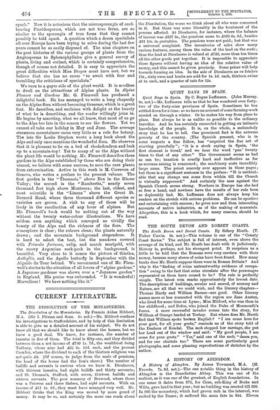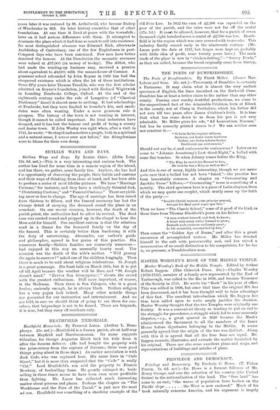A HISTORY OF ABINGDON.
A History of Abingdon. By James Townsend, M.A. (H. Frowde. 7s. 6d. net.)—The one notable thing in the history of Abingdon is the Benedictine Abbey. This was one of the earliest, as it was one of the greatest, of English foundations. In one sense it dates from 675, for assn., sub-King of Berke and Wilts, gave land in that year ; but no building was erected till 699. In 866 the monastery, which had grown rich in the interval, was sacked by the Danes; it suffered the same fate in 944. Eleven years later it was restored by St. Aethelwold, who became Bishop of Winchester in 963. Its later history reseMbles that of other foundations. At one time it lived at peace with the townsfolk ; later on it had serious differences with them. It attempted to dominate the place which it had done so much to call into existence. Its most distinguished alumnus was Edmund Rich, afterwards Archbishop of Canterbury, one of the few Englishmen in post- Conquest days who have been canonised. Few men have better deserved the honour. At the Dissolution the monastic revenues were valued at 437,000 (in money of to-day). The Abbot, who had made the winding-up business easy, received a pension about equivalent to 44,000, with the manor-house of Cumnor. A grammar school refounded by John Roysse in 1563 has had the chequered existence which is often the lot of these institutions. Some fifty years later Thomas Teesdale, who was the first scholar admitted on Roysse's foundation, joined with Richard Wightwick in founding Pembroke College, Oxford. At the end of the eighteenth century under the rule of Lempriere (of " Classical Dictionary" fame) it almost came to nothing. It had scholarships at Pembroke, but they were limited to founder's kin, and candi- dates were often wanting. Under a more generous rule it prospers. The history of the town is not wanting in interest, though it cannot be called important. Its local industries have decayed, and it has lost the honour and profit of being a county and Assize town. If John Wesley was right when, after a visit in 1741, he wrote: " So stupid and senseless a people, both in a spiritual and a natural sense, I scarce ever saw before," the Abingdonians were to blame for their own decay.



























































 Previous page
Previous page